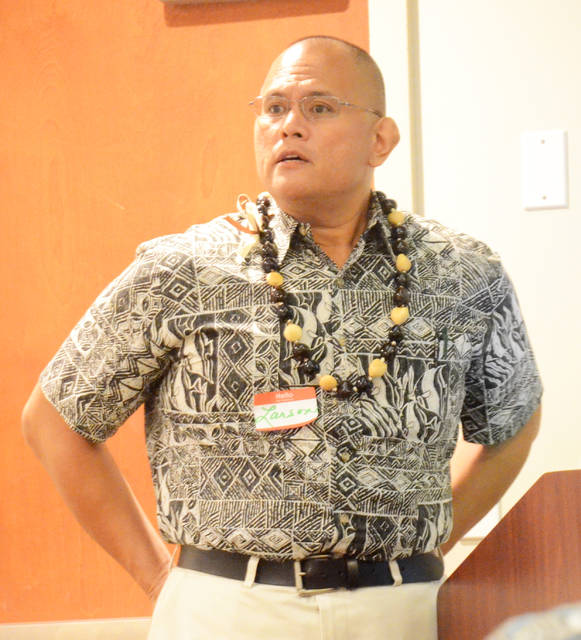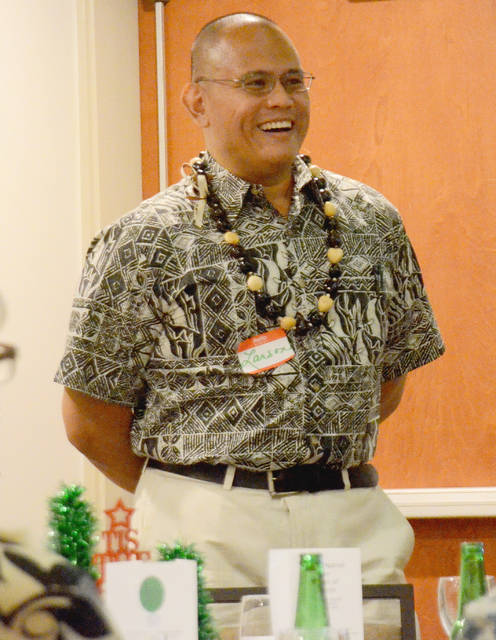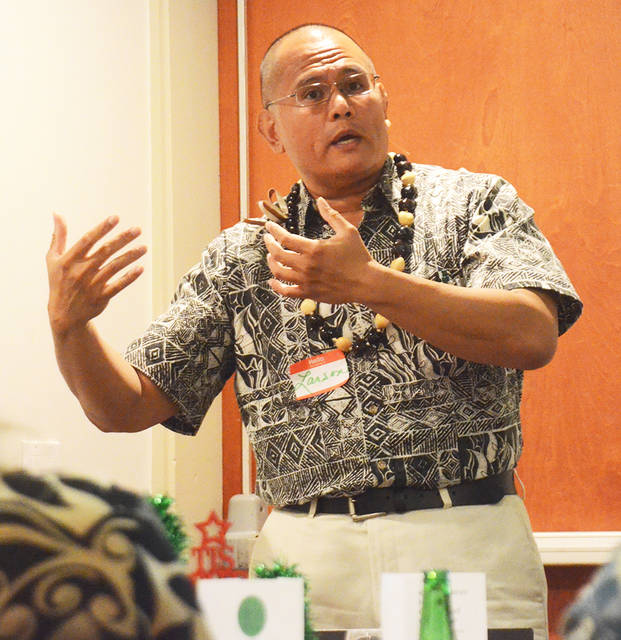Dr. Larson Ng, with the College of Education, University of Hawaii at Manoa, spoke on the role of Hawaiians in Hawaii’s economy, past, present and into the future, at the Kauai Native Hawaiian Chamber of Commerce end-of-year celebration Wednesday at the Hilton Garden Inn.
He shared his views, he said, based on his research in Native Hawaiian education, while his background and passion is economics.
Self-sufficiency, Ng said, is key to self-determination. Good business know-how always seems to be key, but that was lacking when he attended public schools, he said.
“Now, going full circle, I thought it was my kuleana to go back into the one area where we can try to make that effect on the keiki,” he said.
Following are excerpts of Ng’s 30-minute talk to about 20 people.
•••
For me, to take one more step, to get (keiki) in tune, into the mantra of understanding business, finance, and not so much teach them at that young age, but nevertheless, let it enter their mantra, part of the decision-making cycle.
Let’s face it. Not everybody will go into a four-year institution. Whether they go or not, at least we will do our job as educators.
If all else fails, maybe college is not your kuleana, they have something to fall back upon.
•••
On the role of the Hawaiians in Hawaii’s economy, past, present and into the future:
I firmly believe that where Hawaii goes, where Hawaii’s economy goes, regardless of who is sitting in charge, kanaka maoli will have a big role to play as we always have. Especially going into the future.
•••
Let’s take a step back and look into the past, particularly precontact days. Before the arrival of the Europeans, we had an economy of our own. We had what I call sustainable systems of economy at that time. Now, it was sustainable in the sense, it comes to three basic elements, what kept it sustainable and thriving, given the technological level that we had, and the limited resources we had to work with.
First, mauka/makai relationship. Those operating subsistence toward the makai part would go their thing, the guys planting toward the mountain would do their thing. And the system in the relationships that we had, trade, maybe not in a western sense of trade, per se, but marketplace, nevertheless, exchanges could take place and it would work for generations to generations.
•••
The second pillar that kept it sustainable in our system of economy at that time was also the kapu system, which was abolished by King Kamehameha II. But prior to that, the kapu system kept everything in place, kept things where we never had the problems of overfishing, overgrazing, or cutting down things when we shouldn’t have.
•••
Third, we as kanaka, it was always ingrained and you could say even up to today, strict ideas, feelings toward land stewardship. This is our island. Malama aina. You hear this a lot. Back then, that was religious if not outright spiritual. The kanaka worldview would offer to you, back then, as probably everyone in this room knows, was a balance that we had to our god, the alii and the common people. This kept us in check and at the same time, we protected the environment. That worked for generations to generations. That was precontact.
•••
As we move forward to the arrival of the Europeans, the kanaka, Hawaiians, continued being the backbone of the economy. We were the main force in Hawaii.
Sandalwood was in great demand by both east and west China. Now obviously, who did the cutting? It was our people, our men, formed the labor doing all the work. The main source of labor, we had a lot of kanaka filling those roles.
•••
Finally, from U.S. territorial times into the present, of course, particularly in tourism and construction, it is kanaka that formed the backbone of those industries.
What is tourism without the Hawaiians, right? Nevertheless, the construction and whatnot, we Hawaiians, I would say, are very handy with our hands. It’s second nature. It would be intuitive to go into construction at that time.
•••
The crux of the argument, I feel personally, Hawaiians will play a vital role in Hawaii’s economy.
As a researcher, even though I believe in that myself, it’s not enough for me to just say that. I need to have proof, proof for myself. So as I did research, going back to economic theory, the basic elements of all production units of production, capital and labor, those are the basic inputs for any economy. If you want it to grow, it’s very obvious, either one of those variables need to be increased.
Now, having said that, population growth is one of the key ingredients we look for. According to the census, kanaka maoli make up about 20 percent or so of our population.
We as kanaka, our population growth has remained pretty much constant. In 2010 census, if their numbers are correct, we had 289,970 Native Hawaiians. We are projected in 2020 to increase 17 percent to 338,888. Compared to the other ethnic groups, we probably have higher growth.
Going back to economic theory, population growth is one of the key drivers in growing the economy … we’ve got that covered.
We as Hawaiian have to maintain our growth rates, which is indeed key for economic growth.
•••
Having population growth is not enough. In order to be successful, educational attainment comes into play. For the longest times, stereo-typically, it’s always been said Hawaiians, we’re not smart enough, we don’t have the education or maybe the attitudes necessary for higher educational attainment, but that has changed.
Look back to 2010 on the amount percentage-wise of Hawaiians that have some college degrees, associates, all the way up to professional, only 45.7 percent of the population 25 year or older in 2010 of Native Hawaiians had such credentials.
Now statewide, the people who had college degrees from associates, professionals, PhDs, was in the order of 61.3 percent. So we had a 15.6 percent gap between statewide, who had these degrees, and people kanaka maoli that had them.
We have made great strides in improvement. In 2015, the stage average for college education, the percentage of the population 25 years and older who had college education was 63.8 percent. Hawaiians, on the other hand, even though we did not reach the state average proportionally, we had increased to about 50.3 percent of Native Hawaiians 25 years or older who have college degrees.
We narrowed the gap.
This is important to understand. Especially when we want for our people to move into the positions of economic power, to make a bigger stake.
•••
The third element that leads me to believe we will play an important role is in just looking at the occupational trends of our people, Native Hawaiians.
Back in 2010, a lot of Hawaiians were in arts and entertainment fields, educational services and construction. In 2016, there’s been shifts in these findings. With the exception of, to my delight, a lot of Hawaiians have since moved from those service, arts and entertainment, and we have moved beyond that, more into entrepreneurial things, such as trade, wholesale trade has gone up. The amount of Hawaiians operating in professional, scientific management and services has gone up.
That tells me our people are moving, and diversifying into other industries. That tells me that we as Hawaiians are adopting a much larger role, a much more influential role, as evidenced by our presence in the various industries in Hawaii.
In 2016, we see a shift. More of our people are leaving the service industry and moving to other businesses.
Breaking stigmas that Hawaiians are not capable of being in those roles in business that make a difference. That is changing.
•••
The future lies in our hands.
•••
Finally, the last thing that leads me to my belief, we kanaka maoli, in talking about sustainable economy, malama aina will always be alive.
In conclusion, kanaka maoli will continue to be the backbone of Hawaii’s economy. Hawaiians will be instrumental to Hawaii’s future and economic growth.
And finally Hawaiians will ensure Hawaii’s economic and environmental balance from here, now, and into the future.












On an island that is supposedly already too crowded, is it wise to encourage population increase of any ethnic group? Advance degrees open up new opportunities which aren’t necessarily available here on Kauai, so will there be a “brain drain” as the those with advance degrees move to (for instance) Silicon Valley? One way of keeping those “brains” here is to increase the islands communication capacity to support “telepresence”. KIUC is considering getting into the Internet Service Provided market which would help “telepresence” to grow.
Aloha Dr. Ng,
Thank you for this wonderful information and enlightening article.
May I add, considering the deplorable situation it is for some people for the last at least several decades, and including most all of the cultures here in Hawaii, that as important as Hawaiian Economy is, so is the economy of, as it relates to Health, Ke Olokino Kino Kanaka, the health of the human body.
Over weight and obesity are at epidemic proportions, scientific indicators say that 57% of young people will be OBESE BY THE TIME THEY ARE 35 years old.
Obesity is the cousin of not only diabetes but also heart and vascular disease and too many and more and more types of cancers followed by kidney, liver, an colon diseases.
Speaking of education as you so importantly pointed out regarding the Hawaiian culture, is the physical health of all people, Kino Kanaka, the peoples’ bodies.
Hawaii could be the leader in educating keiki starting in early grammar school right through high school graduation, in order to be equally educated about Kino Kanaka as any doctor is, but instead of studying disease…studying HEALTH.
HEALTH IS THE COLMPLETE OPPOSITE TO disease. A Kino Kanaka that is all HEALTH requires no diagnosis, treatments, or surgery. No wasted time from education and career.
What better way to face ones life’s ECONOMY and lower and upper education than to have a Kino Kanaka of FULLY FUNCTIONAL HEALTH.
The mind is as Healthy as the body it is connected to.
May we ask you, Dr. Ng, to influence where you can the educational system to not only expand education in Hawaiian Economy but also the field of Health of the Hawaiians and all othe cultures in each classroom.
Ke Olokino Kino Kanaka, injury or disease ( disease as injury) of the body, is in so many chronic cases disease just not necessary.
Studying Health instead of disease and the precautions and preventions learned from that education can preclude the occurrence of disease.
Every person studying Hawaiian Economy does better in study and career with a Healthy Whole Body.
We hope we made our point clear.
Mahalo,
Charles